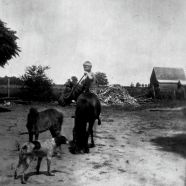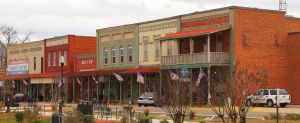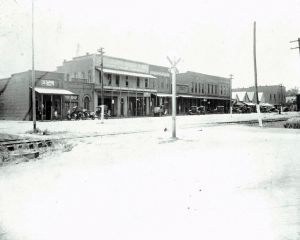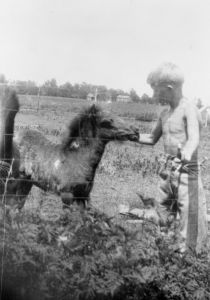The Plainsman: Jimmy Carter in Georgia
I found myself in Plains, Georgia, for the second time in my life this summer, while working as an intern for the Carter Center in Atlanta. Commercialization and sprawl seem to have skipped over Plains, and the main street looks and operates much the same as it did twenty or thirty years ago. Voices lilt from open windows with meltingly slow Southern drawls, and people take “yes, ma’am” and “no, ma’am” very seriously. It’s a time capsule of a town. If you find yourself in Plains (and you’re not already a resident), you’re either dreadfully lost or you’re there for Jimmy Carter. Plains exists as a sort of shrine to the peanut farmer-turned-president, the hometown hero, and you can buy all sorts of campaign memorabilia and peanut-based foods in the general stores. The town served as the headquarters of Carter’s campaign, and it is immensely proud of this fact and this man.
My first visit to Plains was a pilgrimage of sorts to hear former president Carter teach a Sunday school class at his home church along with a large group of acolytes from my own church in Montgomery, Alabama. I was around eight years old, and Plains was just another place I had been dragged to for the sake of cultural enrichment. I had no attachment to or even understanding of this man, Jimmy Carter; so twelve years later when I found out some time into my internship at the Carter Center that the class of summer interns would be taking a trip to Plains, I was amused. This was my life, come full circle.
When we disembarked from our charter bus on a hot July day, the cosmopolitan and wordly interns, many hailing from metropolitan Europe or the Middle East, were delighted and taken aback by the size of the town. They wrinkled their noses and talked about how “cute” this place and these people were. They posed in front of the tiny shops and the lone bed and breakfast and tasted samples of peanut brittle. Over and over, people wondered aloud just how someone like Jimmy Carter came from such a place, and in reality, this is a question worth investigating.
Former president Carter is well known internationally as a distinguished and respected diplomat, negotiator, advocate, and humanitarian. The diversity of the interns who found themselves in Plains on that hot summer weekend is a testament to his far-reaching influence through his work with the Carter Center. On the surface, nothing about Plains seems capable of producing a man like this. There are no diplomats there; the crowd in the diner doesn’t seem interested in discussing the eradication of disease or nuclear disarmament. So we wondered how this man was born of this place.
Our first stop in town was lunch with the former president and first lady in an all-purpose community center, a hollowed-out brick building with hard-working ceiling fans. Town ladies graciously welcomed us, serving up pimiento cheese sandwiches and sweet tea while the Carters, drinking glasses of buttermilk, circulated around the tables of interns. The Carters are not what I would describe as polite—their kindness runs deeper than that. It’s genuine interest. Their manners do not disguise insincerity; they convey warmth. Share a meal with the Carters if you have the chance.
The highlight of the trip came after lunch: an afternoon on the farm just outside Plains where Jimmy Carter grew up. The farm is now a National Historic Site open to visitors, but it still operates as a working farm and the Carters like to eat the food they’ve grown when they’re in town. Jimmy Carter is relaxed here, comfortable in the heat and among the swarming mosquitoes. We gathered around him like schoolchildren near the front porch as he told us stories of his childhood on the farm. Like the good Baptist that he is, his stories have the air of parables, and he speaks with the ease and volume of a rural preacher, the kind he grew up listening to. Many of his childhood stories, some of which make up his book An Hour Before Daylight, are about race. Standing before us on his farm, he recalled to us playing alongside the children of the African American workers who lived on or around his family’s farm, all of them running through the fields together.
“One day,” he will tell you, “my little African American friend opened the gate to the field for me, and waited for me to walk through before following after, and I knew he had been told that we were different.” He was stricken. At this moment, it was clear to him that they were not different. The African Americans who he lived among laughed as he did, played as he did, and loved as he did. In Plains, he and his family defied many social boundaries, treating everyone with respect. Throughout his life he has maintained that same respect with the very people society would have segregated him from, and as a result he was blessed with the most meaningful relationships. He smiled as he told this story but presented our takeaway message from Plains with gravity: always consider the goodness in people, despite differences.
Jimmy Carter has never understood nor tolerated arbitrary declarations of difference, and this unwavering belief in equality became one of his most important values. Many might say that his upbringing in Plains was a disadvantage, an obstacle that makes his rise to the presidency all the more impressive and surprising, but he rejects this kind of thinking. On the farm he saw and learned the importance of hard work; among the classically hospitable ladies of Plains he learned how far kindness and good manners will go; and during times of hardship and depression he understood the importance of family and the strength of ties that bind. His story of encountering racism captures the moment he was able to determine that no superficiality—not race, ethnicity, nationality, or political party—could obscure the basic truth that all humans are capable of and deserving of love. As with many parables, President Carter’s stories of his childhood and the small-town values they represent belie a great truth and power.
When President Carter invited Israeli Prime Minister Menachem Begin and Egyptian President Anwar El Sadat to Camp David in search of finding peace between their nations, he famously and tirelessly mediated what seemed to be an argument without a solution. On September 17, the final day of the peace talks, Begin threatened to walk away and end it all over a disagreement about Jerusalem. Not one to resort to threats, Carter again relied on his faith in the power of love. He gathered Begin’s family photos and wrote the names of Begin’s grandchildren beneath the photos, presenting them to him with the plea that he consider their lives and their futures when resigning to the prospect of war. Begin cried, moved by the grace of the gesture. He agreed to the terms, and the Camp David Accords, monumental in the journey toward peace in the Middle East, were signed.
It seemed unlikely that a world-class diplomat could emerge from the dusty fields of Plains, Georgia. In reality, the lessons Jimmy Carter learned from life in a small town during a hard time became his biggest strengths and helped form his best qualities as a negotiator, a politician, and a man. And For that you can thank the buttermilk-drinking, peanut-farming, slow-talking people of Plains.











The term “homey” is used to refer to friends and supporters, mostly in sports and the inner city. Jimmy Carter, who lives as everyone’s hometown friend, has become America’s “homey”
I was in Plains when Began came to an open field on a copter to meet Jimmy and wife, he spoke a few.minutes, before they left for the house.
Your essay makes some good points. Jimmy Carter’s life and his lifelong practice of love and compassion is a message that cannot be delivered too often. I thought one sentence about the unlikelihood of a great man coming from such a humble place would have been enough.